Diversity and the Cities of Man and God
Diversity
I like the differentness of Ho Chi Minh City (which is not the same as wishing it upon my home country):
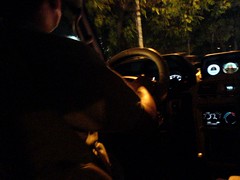
driving with one hand ever-ready at the horn,

ubiquitous phở, iced lotus tea, teeth-melting ca phe,
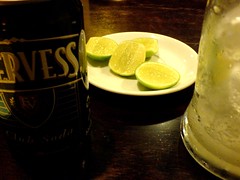
soda chanh for vitamin C,
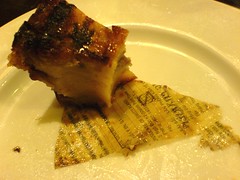
how cake tins are lined with the yellow pages,
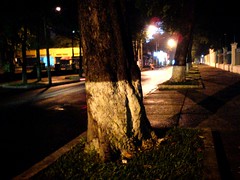
numbered trees with their bases painted white,
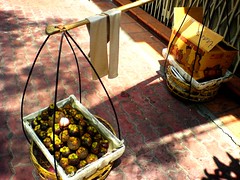
fresh fruit touted by ladies in conical hats,
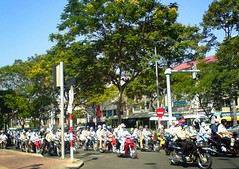
how, at night, motorcycle headlamps are like fairylights from afar, and being threatened with Honda Om tyremarks across the face about 10,000 times a day,
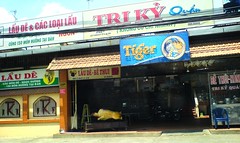
whole goats being roasted in shopfronts,
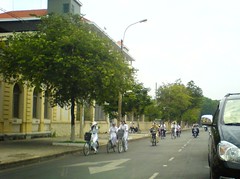
kids cycling home from school in ao dais,

earnest tour guides saying "Ho Chi Minh was a very nice and very handsome man. Everyone who met him loved him",
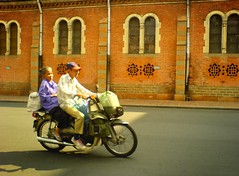
motorcyclists wearing caps instead of helmets,
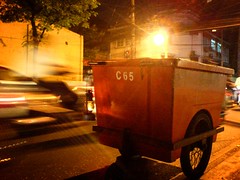
roadsweepers pushing along their huge orange dumpsters and keeping the city clean,
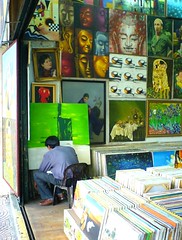
art copies being better than the stuff in Saigon museums,

the extreme foulness of mắm ruốc, pale sickly looking Vietnamese chilli that really numb the taste buds,
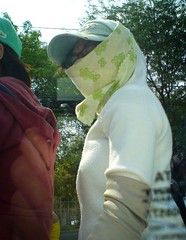
women wrapped up against the sun,
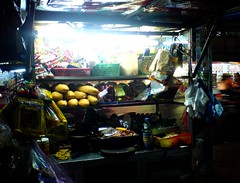
colonial hangovers like roadside bánh mì (baguettes) and
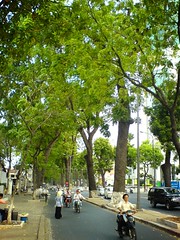
tree-lined boulevards radiating out from a central monument or round-about, women hanging out about town in pajamas...
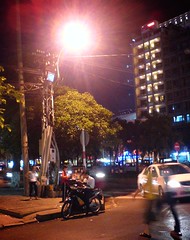
...how life is lived out on the streets: how cameras are repaired on corners and watches traded and cigarettes sold from open briefcases, reading under street lamps,
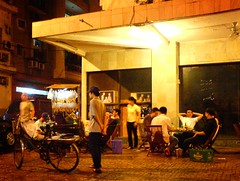
eating places and drinks stalls along roads and outside shuttered shops with their little plastic furniture neatly set out, cuttlefish vendors and lottery ticket sellers strolling about the tables, young fire-eaters entertaining bemused customers, men sitting around in the morning with their ca phe chatting and reading the papers, people gawking through tall windows at foreigners indoors as at animals in the zoo. How unlike, say, England, where a Malaysian mate, squatting on the pavement waiting for his friend, was showered with 20p coins from goodhearted but mistaken passersby...
And its sameness: how it is, simply, a growing changing city with all the common problems of a growing changing city.
At lunch with some Vietnamese businessmen, I asked about the regulation of Saigon's multitudinous motorcycles:"These giu xe's (parking places). Are they the result of some law or government policy to keep the city neat and clean?" The Vietnamese businessmen laughed long and hard into their bowls of phở at my foreigner's ignorance. When they'd finally wiped their eyes, one said,"If you leave your motorbike on the road ah, when you come back, there is no more motorbike ah". Which set them off again for a good while.
Cultural heterogeneity and city homogeneity - c'est cool.
Diversity is totally enjoyable, and learning different languages and experiencing other cultures terribly exciting. But our differentness and diversity have a sinister history: the curse of Babel.
Rise of Cities
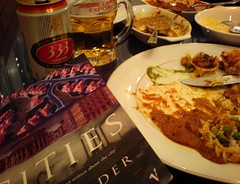
Cities, according to John Reader's Cities, are really things of marvel, intricate organisms: just think, for example, about the mystery of their historical roots - were they born of agricultural surpluses or was the requirement of specialised trades the main factor? Was their original aim the provision of security within walled defenses? Did they grow by being economic centres for trading and by the churning of money, the making of fortunes? And think of the richness of urban complexity: the planning of cities - water supply, sanitation, the spacing of housing to avoid overcrowding and prevent the spread of pestilence, constructing effective public transportation systems; the regulation of the population of cities - crime, violence, corruption, pollution, laws to govern how a mass of people can live harmoniously within a confined space, electing the lawmakers who are to make such laws...
Most people also equate cities with civilisation and creature comforts: central heating in winter, air-conditioning in summer, electricity and the delight of electrical appliances, movie theatres, bountiful libraries, 24-hour convenience stalls, flush toilets. An Economist article, The World Goes To Town, touts the development of cities as being synonymous with human development. More than just the modern conveniences, cities epitomise the pinnacle of human achievement: fecund hotbeds for wonderful new inventions, for being freed from such base worries as the acquisition of daily food and drink to advance the frontiers of knowledge about our selves and our world, to dabble in art and music and culture and the detailed discussion of jazz chords.
But we are told that the first cities were nasty things. The construction of the first cities were not signs of human development but human regression - rebellion against God. Cities were the architectural representation of one's hired (SIM) gardener marking out one's vegetable plot and claiming sovereignty over the patch.
Cain built the first city and named it after his son Enoch. Because Cain had earlier killed his own brother and spilt his blood on the ground, his days of getting food from the ground were over and he was to be a fugitive and wanderer on the earth, getting food from other sources. But God in his mercy had promised Cain that though he'd punished him, he would also continue to protect him from his enemies (Genesis 4:8 - 16). It might have been that Enoch did not trust God for protection or he might have thought that God's protective mark on him lacked any efficacy, for he proceeded to settle at Nod, there building for himself a something he might have been more confident would defend him from enemies - a city (Genesis 4:17). If this is true, then the Psalmist later laughs at such misguided folly in trusting in hackable walls and sleepy watchmen, rather than an undefeatable God for protection:
Fall of Cities
The recorded past demonstrates the impermanence of cities. Greece and Rome once great centres of learning, innovation and sophistication in their own times have since retired quietly into pretty tourist destinations. Where once great military conquerors were feted; where thronged successful merchants and agriculturalists; where governance was sophisticated and well-thought out with laws of contract and property and family, law courts and routes of appeal; where flourished refined art, monumental works of architecture, intricate jewellery-work, impressively accurate astronomy, the ancient cities of Assyria and Babylon now exist only as museum exhibits. Perhaps the city that manages to continuously reinvent itself might survive? Statistically, this is improbable.
And in reality, this is impossible.
Of the great city of Babylon, Nebuchadnezzar once boasted:"Is this not magnificent Babylon, which I have built as a royal capital by my might power and for my glorious majesty?" (Daniel 4:30). And truly, Babylon was one of the wonders of the ancient world with its hanging garden and lofty walls and ziggurats and beautiful Ishtar Gate. Today, its ruins span over two thousand acres. But ruins, they are, the beauty and magnificence of human constructs ultimately amounting to nothing. In the end, warned Isaiah,"Babylon, the glory of kingdoms, the splendour and pomp of the Chaldeans, will be like Sodom and Gomorrah when God overthrew them"(Isaiah 13:19).
Cities For The Redeemed
Though in this life and on this earth we have no lasting city, we seek a city that is to come (Hebrews 13:14) whose architect and builder is God (Hebrews 11:10). Re-reading Revelation reminds me how much I long for that city:
I like the differentness of Ho Chi Minh City (which is not the same as wishing it upon my home country):

driving with one hand ever-ready at the horn,

ubiquitous phở, iced lotus tea, teeth-melting ca phe,

soda chanh for vitamin C,

how cake tins are lined with the yellow pages,

numbered trees with their bases painted white,

fresh fruit touted by ladies in conical hats,

how, at night, motorcycle headlamps are like fairylights from afar, and being threatened with Honda Om tyremarks across the face about 10,000 times a day,

whole goats being roasted in shopfronts,

kids cycling home from school in ao dais,

earnest tour guides saying "Ho Chi Minh was a very nice and very handsome man. Everyone who met him loved him",

motorcyclists wearing caps instead of helmets,

roadsweepers pushing along their huge orange dumpsters and keeping the city clean,

art copies being better than the stuff in Saigon museums,

the extreme foulness of mắm ruốc, pale sickly looking Vietnamese chilli that really numb the taste buds,

women wrapped up against the sun,

colonial hangovers like roadside bánh mì (baguettes) and

tree-lined boulevards radiating out from a central monument or round-about, women hanging out about town in pajamas...

...how life is lived out on the streets: how cameras are repaired on corners and watches traded and cigarettes sold from open briefcases, reading under street lamps,

eating places and drinks stalls along roads and outside shuttered shops with their little plastic furniture neatly set out, cuttlefish vendors and lottery ticket sellers strolling about the tables, young fire-eaters entertaining bemused customers, men sitting around in the morning with their ca phe chatting and reading the papers, people gawking through tall windows at foreigners indoors as at animals in the zoo. How unlike, say, England, where a Malaysian mate, squatting on the pavement waiting for his friend, was showered with 20p coins from goodhearted but mistaken passersby...
And its sameness: how it is, simply, a growing changing city with all the common problems of a growing changing city.
At lunch with some Vietnamese businessmen, I asked about the regulation of Saigon's multitudinous motorcycles:"These giu xe's (parking places). Are they the result of some law or government policy to keep the city neat and clean?" The Vietnamese businessmen laughed long and hard into their bowls of phở at my foreigner's ignorance. When they'd finally wiped their eyes, one said,"If you leave your motorbike on the road ah, when you come back, there is no more motorbike ah". Which set them off again for a good while.
Cultural heterogeneity and city homogeneity - c'est cool.
Diversity is totally enjoyable, and learning different languages and experiencing other cultures terribly exciting. But our differentness and diversity have a sinister history: the curse of Babel.
Rise of Cities

Cities, according to John Reader's Cities, are really things of marvel, intricate organisms: just think, for example, about the mystery of their historical roots - were they born of agricultural surpluses or was the requirement of specialised trades the main factor? Was their original aim the provision of security within walled defenses? Did they grow by being economic centres for trading and by the churning of money, the making of fortunes? And think of the richness of urban complexity: the planning of cities - water supply, sanitation, the spacing of housing to avoid overcrowding and prevent the spread of pestilence, constructing effective public transportation systems; the regulation of the population of cities - crime, violence, corruption, pollution, laws to govern how a mass of people can live harmoniously within a confined space, electing the lawmakers who are to make such laws...
Most people also equate cities with civilisation and creature comforts: central heating in winter, air-conditioning in summer, electricity and the delight of electrical appliances, movie theatres, bountiful libraries, 24-hour convenience stalls, flush toilets. An Economist article, The World Goes To Town, touts the development of cities as being synonymous with human development. More than just the modern conveniences, cities epitomise the pinnacle of human achievement: fecund hotbeds for wonderful new inventions, for being freed from such base worries as the acquisition of daily food and drink to advance the frontiers of knowledge about our selves and our world, to dabble in art and music and culture and the detailed discussion of jazz chords.
But we are told that the first cities were nasty things. The construction of the first cities were not signs of human development but human regression - rebellion against God. Cities were the architectural representation of one's hired (SIM) gardener marking out one's vegetable plot and claiming sovereignty over the patch.
Cain built the first city and named it after his son Enoch. Because Cain had earlier killed his own brother and spilt his blood on the ground, his days of getting food from the ground were over and he was to be a fugitive and wanderer on the earth, getting food from other sources. But God in his mercy had promised Cain that though he'd punished him, he would also continue to protect him from his enemies (Genesis 4:8 - 16). It might have been that Enoch did not trust God for protection or he might have thought that God's protective mark on him lacked any efficacy, for he proceeded to settle at Nod, there building for himself a something he might have been more confident would defend him from enemies - a city (Genesis 4:17). If this is true, then the Psalmist later laughs at such misguided folly in trusting in hackable walls and sleepy watchmen, rather than an undefeatable God for protection:
Unless the LORD builds the house,The city of Babel was more obvious edifice of rebellion against God (Genesis 11:1-9). Its inhabitants said, "Come, let us build ourselves a city and a tower with its top in the heavens, and let us make a name for ourselves, lest we be dispersed over the face of the whole earth." They sought honour and glory for themselves that properly belonged to the name of God. They sought security in their bricks and mortar rather than in God.
those who build it labor in vain.
Unless the LORD watches over the city,
the watchman stays awake in vain. (Psalm 127:1)
Fall of Cities
The recorded past demonstrates the impermanence of cities. Greece and Rome once great centres of learning, innovation and sophistication in their own times have since retired quietly into pretty tourist destinations. Where once great military conquerors were feted; where thronged successful merchants and agriculturalists; where governance was sophisticated and well-thought out with laws of contract and property and family, law courts and routes of appeal; where flourished refined art, monumental works of architecture, intricate jewellery-work, impressively accurate astronomy, the ancient cities of Assyria and Babylon now exist only as museum exhibits. Perhaps the city that manages to continuously reinvent itself might survive? Statistically, this is improbable.
And in reality, this is impossible.
Of the great city of Babylon, Nebuchadnezzar once boasted:"Is this not magnificent Babylon, which I have built as a royal capital by my might power and for my glorious majesty?" (Daniel 4:30). And truly, Babylon was one of the wonders of the ancient world with its hanging garden and lofty walls and ziggurats and beautiful Ishtar Gate. Today, its ruins span over two thousand acres. But ruins, they are, the beauty and magnificence of human constructs ultimately amounting to nothing. In the end, warned Isaiah,"Babylon, the glory of kingdoms, the splendour and pomp of the Chaldeans, will be like Sodom and Gomorrah when God overthrew them"(Isaiah 13:19).
Cities For The Redeemed
Though in this life and on this earth we have no lasting city, we seek a city that is to come (Hebrews 13:14) whose architect and builder is God (Hebrews 11:10). Re-reading Revelation reminds me how much I long for that city:
And I saw no temple in the city, for its temple is the Lord God the Almighty and the Lamb. And the city has no need of sun or moon to shine on it, for the glory of God gives it light, and its lamp is the Lamb. By its light will the nations walk, and the kings of the earth will bring their glory into it, and its gates will never be shut by day--and there will be no night there. They will bring into it the glory and the honor of the nations. But nothing unclean will ever enter it, nor anyone who does what is detestable or false, but only those who are written in the Lamb's book of life.
Then the angel showed me the river of the water of life, bright as crystal, flowing from the throne of God and of the Lamb through the middle of the street of the city; also, on either side of the river, the tree of life with its twelve kinds of fruit, yielding its fruit each month. The leaves of the tree were for the healing of the nations. No longer will there be anything accursed, but the throne of God and of the Lamb will be in it, and his servants will worship him. They will see his face, and his name will be on their foreheads. And night will be no more. They will need no light of lamp or sun, for the Lord God will be their light, and they will reign forever and ever.(Revelation 21:22 - 22:5)
Labels: Travels, Travels: Ho Chi Minh City, Travels: Saigon, Urbanity or Just Urbanism







0 Comments:
Post a Comment
Subscribe to Post Comments [Atom]
<< Home